Summary
Blooders is known for developing technology that transforms the Voluntary Blood Donation Activity into a positive experience. They have launched the first digital platform in LATAM which connects people who need blood with non-remunerated voluntary donors and hospitals to enhance the donation experience. If there is a patient that has encountered an emergency and needs blood, the mobile application allows the community to interact quickly and easily, members help in the process of recruiting voluntary blood donors to meet the patient’s needs. Furthermore, Blooders developed an interactive website, a digital chatbot agent available 24/7 to interact with the community, and a blood bank management system with visionary features.
About Blooders
In 2014, Blooders was founded by the brothers Javier and César Esquivel. The company’s name came from the word game "Blood and Brothers." The organization’s mission is to promote, educate, and facilitate blood donations through technological platforms and innovation.
Blooders has developed technology to connect people who need blood with donors and hospitals to enhance the blood donation experience. If there is a patient that has encountered an emergency and needs blood, the mobile application allows the community to interact quickly and easily, members help in the process of recruiting voluntary blood donors to meet the patient’s needs. Furthermore, Blooders developed an interactive website, a digital chatbot agent available 24/7 to interact with the community, and a blood bank management system with visionary features.

How Is It Constituted?
The operational activities of the company are carried out through a hybrid model, establishing a non-profit organization (Blooders Civil Society) and a for profit organization (Joint Stock Corporation to Promote Investment).
“Blooders” believes that it is through social entrepreneurship that one can achieve financial sustainability and thus be able to solve the problem of being self-sustainable and expand, not only locally, but also internationally.
This organization strives to breakdown the stigmas imposed in the business environment whereby business activities are believed to be solely for commercial purposes. For this reason, Blooders is making a positive social impact by offering technological tools and services which were developed for the improvement of the supply chain management of blood banks, in order to maintain responsible blood inventories.
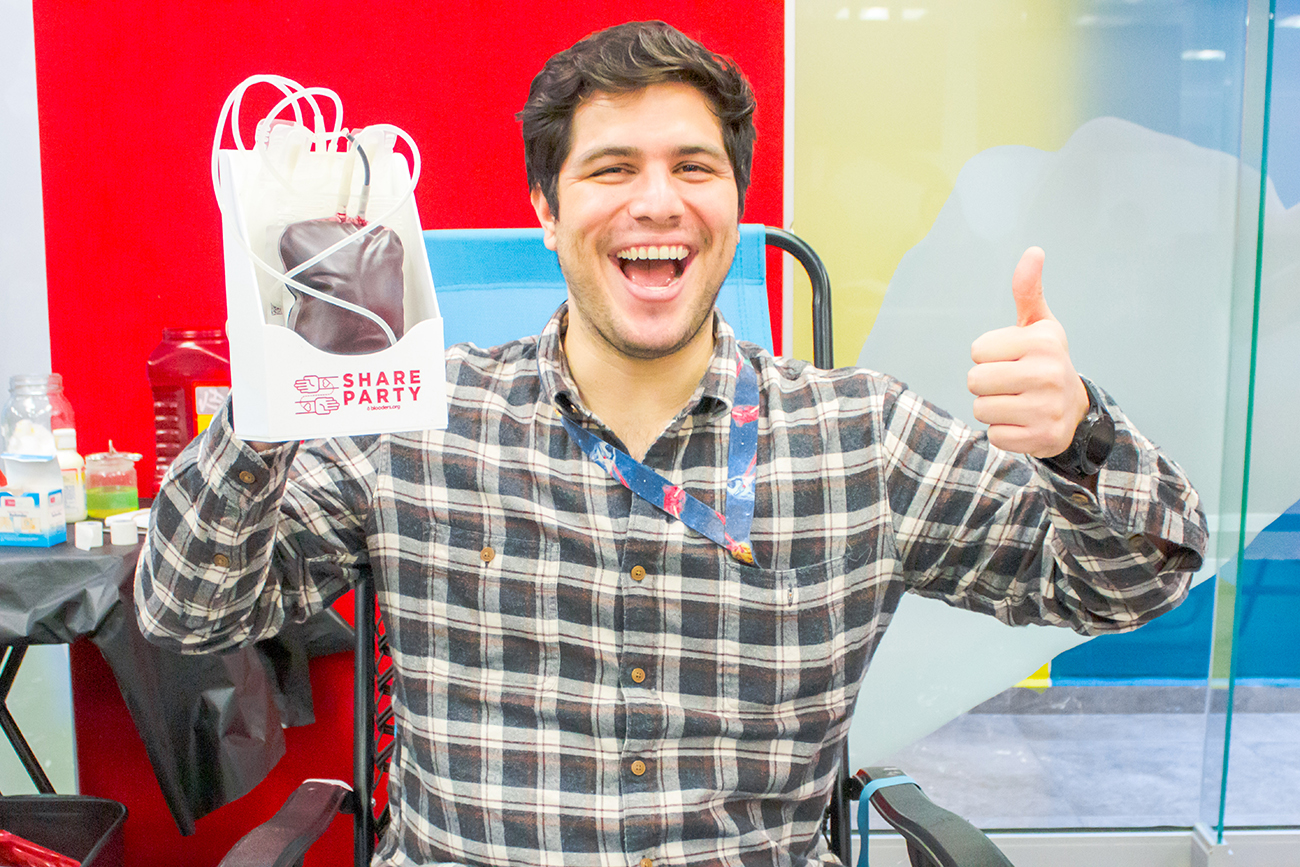
Volunteer Donor in Accenture 2018.
Source: Blooders
How Was It Born?
In 2013, a friend of an older sibling of César Esquivel, president and co-founder of Blooders, urgently needed blood donations for his wife because she had been diagnosed with leukemia and was in the emergency room at the hospital. He approached César and asked for help, as he knew César was studying for a master's degree in hospital administration and health services. However, César, overworked, forgot to help and didn’t call back. Three weeks later Carlos' wife passed away.
Fortunately, at that time in his life, no one in César and Javier's family had faced any risky situation in which they needed blood, so they were unaware of one of the most life-threatening social issues in Latin American, blood safety and availability. After that, both brothers volunteered as blood donors at a public hospital and realized that there were several needed improvements and there were lots of opportunities to upgrade blood processes and boost non-voluntary blood donations. The main problems that caught their attention were the long waiting times at queue lines for voluntary donations, the blood donation process was extremely exhausting (the process took almost five hours when it is should take between eight to 12 minutes), as well as the lack of a schedule-based appointment system. Worst case scenario, there was no standardization in the information found on websites and clearly the health personnel that worked at the hospital had not undertaken specialized trainings on the matter.
Time passed by, and a few weeks after the event, Javier got the chance to participate in an entrepreneurship challenge named "StartupBus." The objective of this challenge was to propose creative solutions to different kinds of problems that were clearly identified. The team members traveled around for a few hours on a truck that departed from Mexico City, to make the challenge more interesting. Then the ideas were proudly presented at the SXSW festival in Austin, Texas. In this challenge, Javier got engaged in creating a disruptive solution called "Usupply.me," by developing a tool that optimized purchasing processes and connected buyers with sellers.
Javier's team had had an excellent performance, so he came back very happy because he greatly enjoyed the experience and met new people. This is why he suggested to César, the idea of using the "Usupply.me" prototype tool to start connecting blood donors with people who needed blood on short notice. Then, the following week, the "Startup Weekend" event was held in Monterrey, Mexico, where Javier and César had the opportunity to develop the first digital platform that connects voluntary blood donors with people in need of blood supplies and they came up with the idea of “Blooders” as a civil society that would revolutionize the blood donation experience, but, above all, they believed that they were going to create value for their society and improve blood services around the globe.
They were thrilled with the response at the Startup Weekend after launching the whole Blooders framework, so they decided to continue to work on the company until it grew to be the organization it is today.
Why Was the Platform Created?
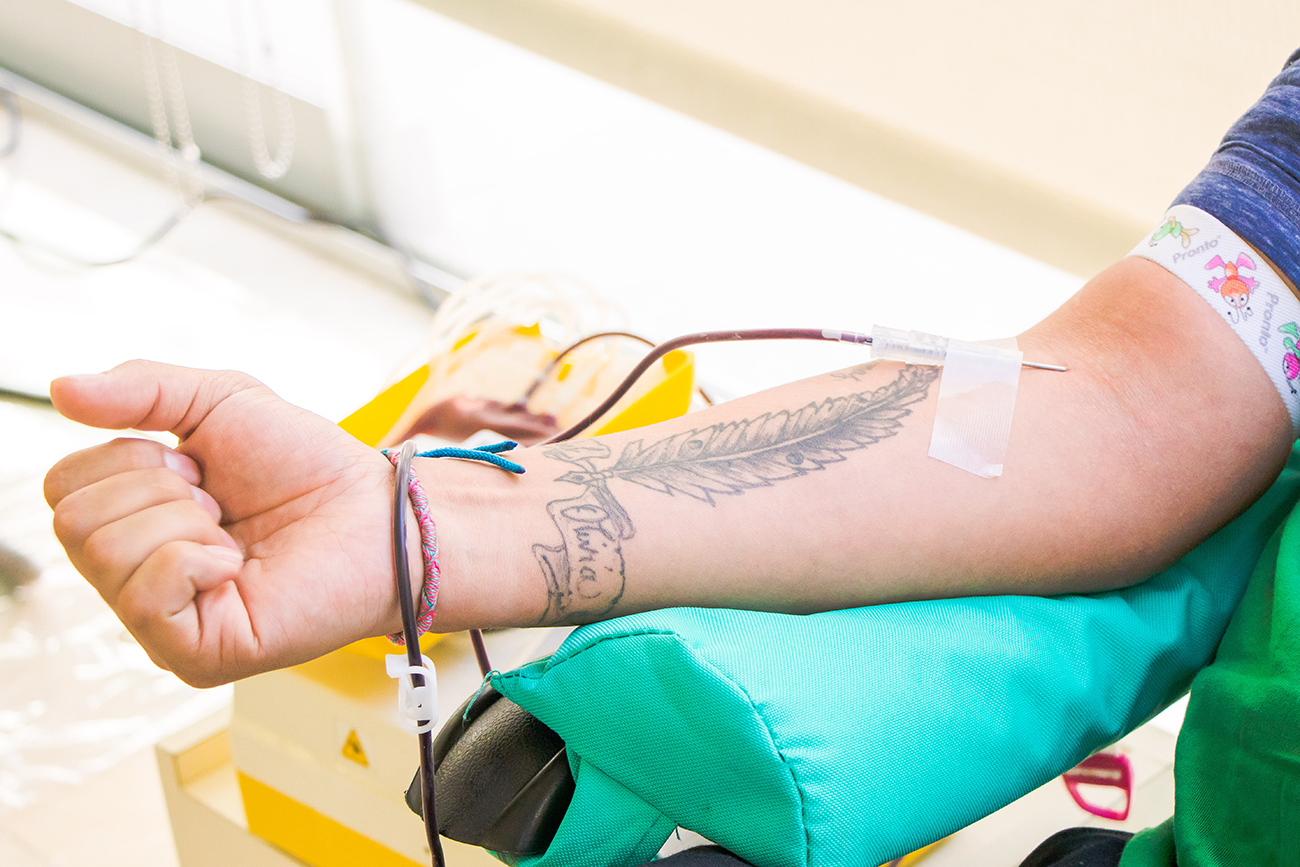
Volunteer Donor in Tetrapak 2019.
Credit: Blooders
If we undertake a deep research analysis, according to Hosfstede’s1 insights and framework, the factors that represent Mexican culture in relation to other cultures around the world, is a high level of long-term commitment to group members such as our families. This implies that Mexican culture is known as a collective society which is driven by values such as loyalty and collectivism. This data supposes that not only does the community care for and protect its own family members, but they also cultivate empathy for neighbors in spite of not knowing him. As they say: “El pueblo, unido, jamás será vencido,” meaning “If they stay together, they will never be defeated." Mexicans feel they have a responsibility to take care of others and save the lives of other people even if they do not share blood relationships with them.
The perfect example is September 9, 2017 at 13:14 when nature caused an earthquake in Mexico City and the states of Morelos, Puebla, Mexico, Veracruz, Guerrero, Hidalgo, Oaxaca, Tlaxcala, and Michoacán. One of the worst catastrophes ever experienced in the country, on the same day as the anniversary of the 1985 Mexico Earthquake. More than 350 people were reported dead and 100 disappeared.2 What did the Mexican population do? They gathered together and supported the community in different ways by collecting donations, trying to save people who were in danger, and donating blood for those who were victims of the natural disaster. At that time, Blooders, like many other organizations, became part of the lifesaving efforts by providing their digital tools and services to the government, and the entire country, in order to facilitate better means of communication. They also implemented a contingency plan where they provided real time information through their platform, so blood donors were guided and helped in assessing scheduled appointments for the donations and allowing the community to make better, well-informed decisions. Nevertheless, we must ask, why do we always wait for this type of situation to take place in order to take immediate action when the safety of blood conditions and availability is recognized as a human right?
Why Is It an Innovation?
Based on the guidelines of the 4.0 Industry, Blooders accomplished the challenge of developing an intelligent tool, considered a technological innovation service, that is revolutionizing the health sector all over the world, since its system emphasizes the interconnectivity of all departments of blood banks, the digitalized donation process, and blood components.
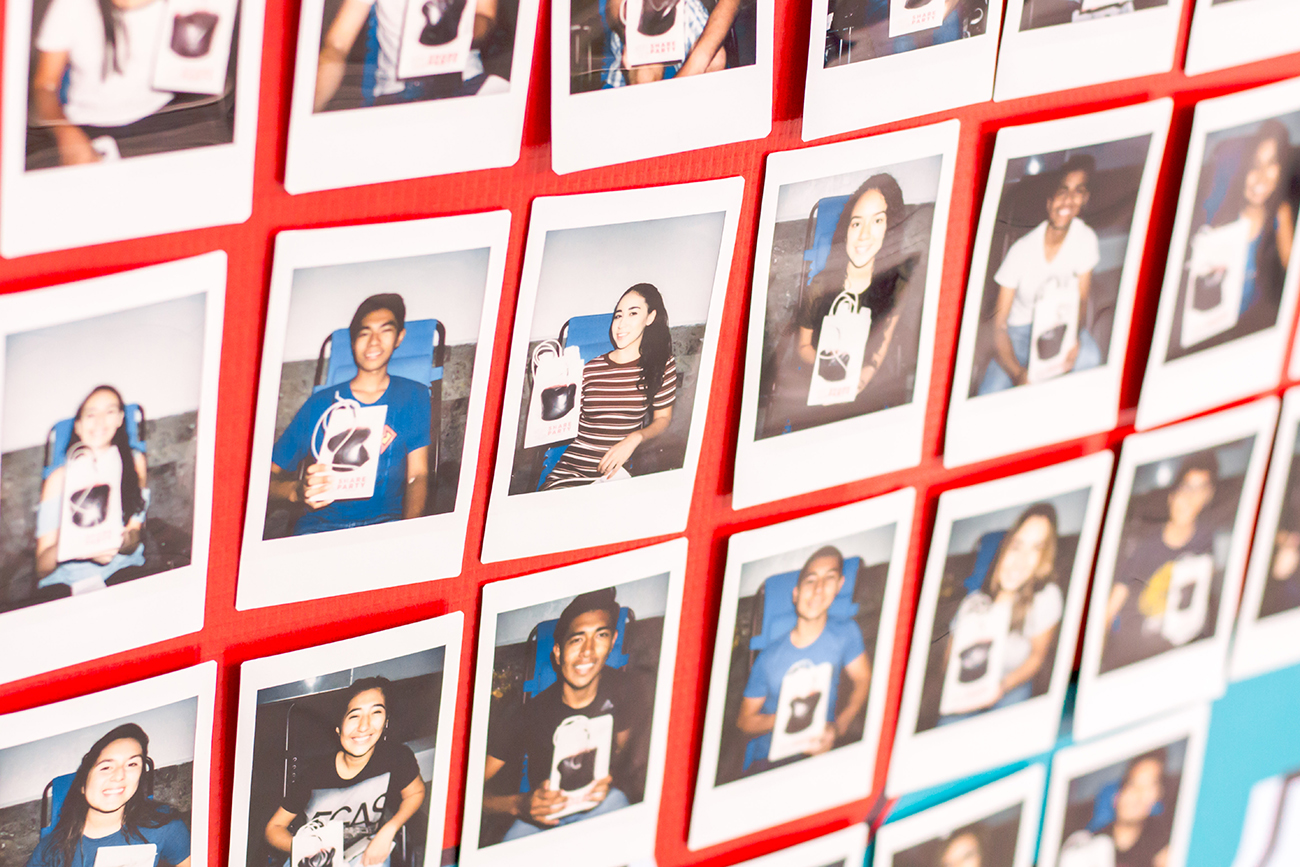
Donors’ Pictures in Montemorelos 2019.
Credit: Blooders
In the near future, Blooders seeks to solve one of the biggest challenges the blood service has, the democratization of blood components, through technological tools, platforms, and services, by optimizing the exchange of information, thanks to the internet of things, cloud computing, data integration, and technological advances with its own blood bank management system called SAFTU.
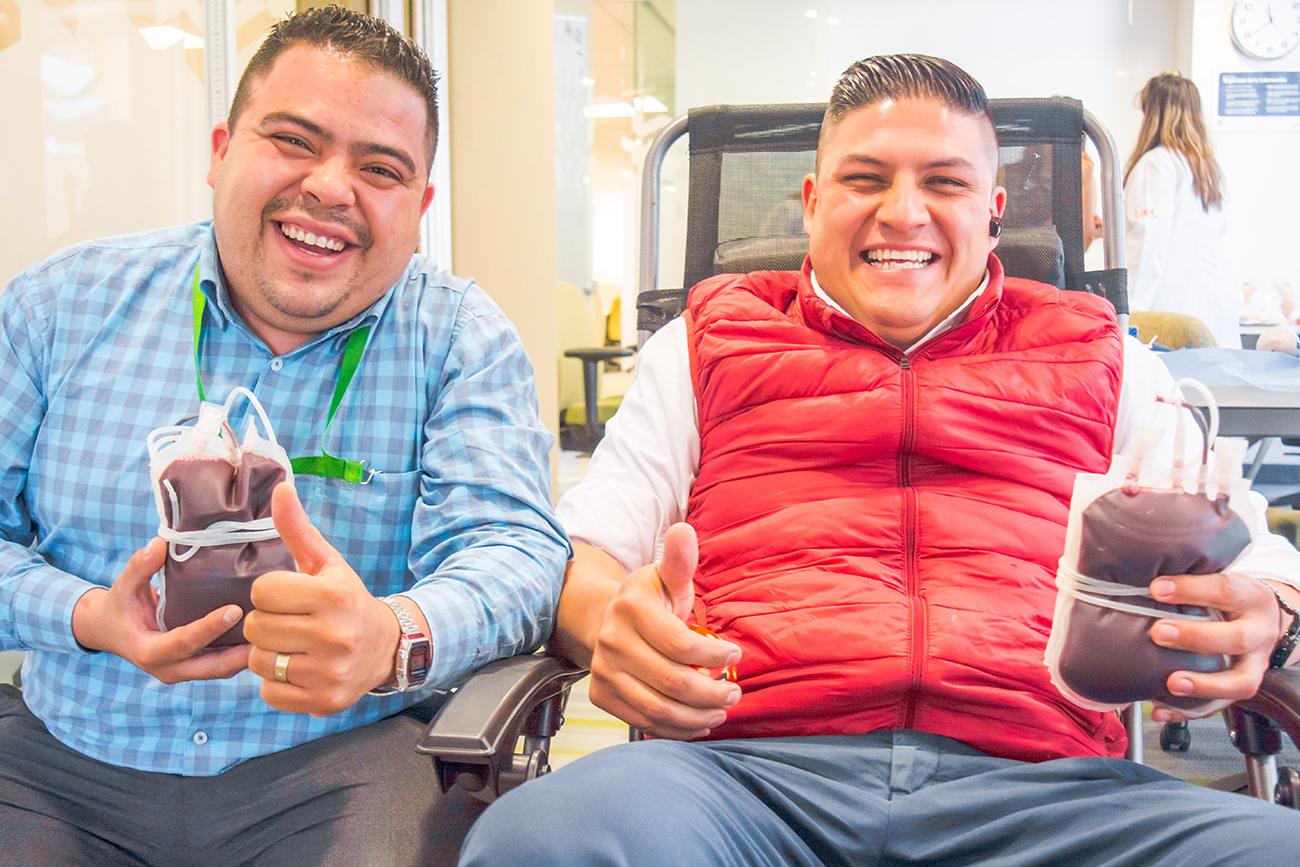
Volunteer Donors in Softek, the City of Mexico in 2018.
Credit: Blooders
Some Obstacles in the Entrepreneurship Process
One of the first obstacles was, how do we create and launch a company to be able to start and execute our operating activities? At first, the civil society created and was financially sustained by César. However, over the years, they realized that they were not going to be able to finance the project or generate an extremely positive impact even though they wanted to, because they had a lack of money, so they began to look for options on how to gain financial sustainability for the project.
So, they made an elevator pitch for a well- known venture capital and business accelerator called "Startup Studio." After gaining the support of the studio, Blooders had the opportunity to start prototyping several tools until they reached the one that is available today, which is a monthly license for the use of unconventional technology to manage blood banks (SaaS) as well as external blood donation campaigns.
The most difficult situation that Blooders had to overcome had to do with the fact that neither Javier nor César are chemists nor doctors, and the staff of the blood banks saw them as people from an external world who wanted to change things for their convenience, so they felt they couldn’t be part of the team. The “trust” factor was basically what was missing to establish a confident relationship between the counterparts. Back in the year 2017, on the World Donor Day, Blooders appeared on national television and a professional chemist had the chance to listen to the program. Later, she contacted César and Javier and pointed out that she was interested in supporting this type of activity, and today they have made a very important collaborative relationship.
The chemist, Q. Estrada, played a key role in Blooders performance, because after a short time, she brought incredible people to join and boost the project such as Dr. Malagon, Dr. D'Artote, as well as Dr. Torras. After having the expertise of this committee and support group, people began to believe in Blooders, as they had proven that they were working really hard to change the reality of existing health services and improve its conditions.
Are We Making an Impact?
More than 13,000 voluntary, non-remunerated blood donations have been processed through Blooders, so indirectly, Blooders has contributed and impacted more than 39,000 people. Each time a person donates blood, potentially it can impact the lives of up to three people, and additionally, the blood can be divided into plasma, platelets, and red blood cells.
On the digital tool’s database, Blooders has more than 36,000 potential blood donors who are part of their community and network. As of 2019, Blooders has organized more than 300 "Share Parties," campaigns where more than 7,000 people have donated blood.
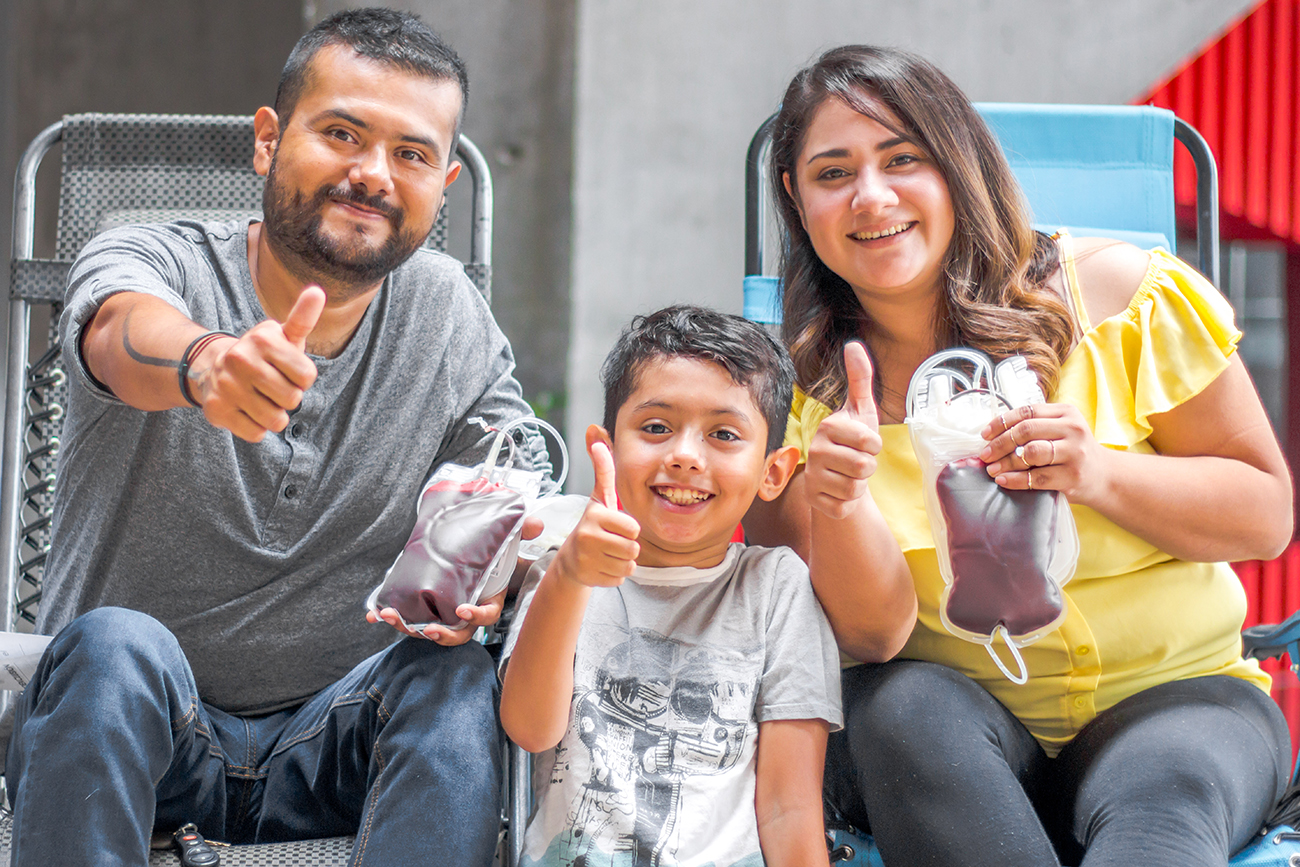
Donors: Pavilion M
Credit: Blooders
Blooders currently operates the "Share Parties" model in Monterrey, Guadalajara, and Mexico City and seeks to take it to more cities in Mexico as well as Latin America. Also, they are currently developing an educational program for students enrolled in elementary, middle, and high school courses, called "Blooders EDU." The program is focused on creating awareness and preparing future blood donors through interactive activities and technological tools.
In addition, they seek to support blood banks through their blood bank management system to facilitate the complete blood donation experience.
Donating blood doesn't hurt, what hurts is when you need it but cannot have it.
Author bios

Gisell Silva is the International Operations Manager at Blooders and Leader of the Blooders Educational Program. Soon-to-be graduate with a bachelor’s degree in financial administration from Tecnológico de Monterrey Campus, Monterrey. She has worked in internationally well recognized companies such as MSCI (Morgan Stanley Capital International) Inc. and The Walt Disney World Company and participated in national and international scholarship programs. Gisell also is an ambassador of the PLEI Program (Program of International Business Leadership) at the Tecnológico de Monterrey. She holds a certification in business ethics from Centro VALIA and was awarded with the diploma DAE and Certificate CIEN from Tecnológico de Monterrey for her extraordinary participation in programs in business administration and social and sustainable programs.
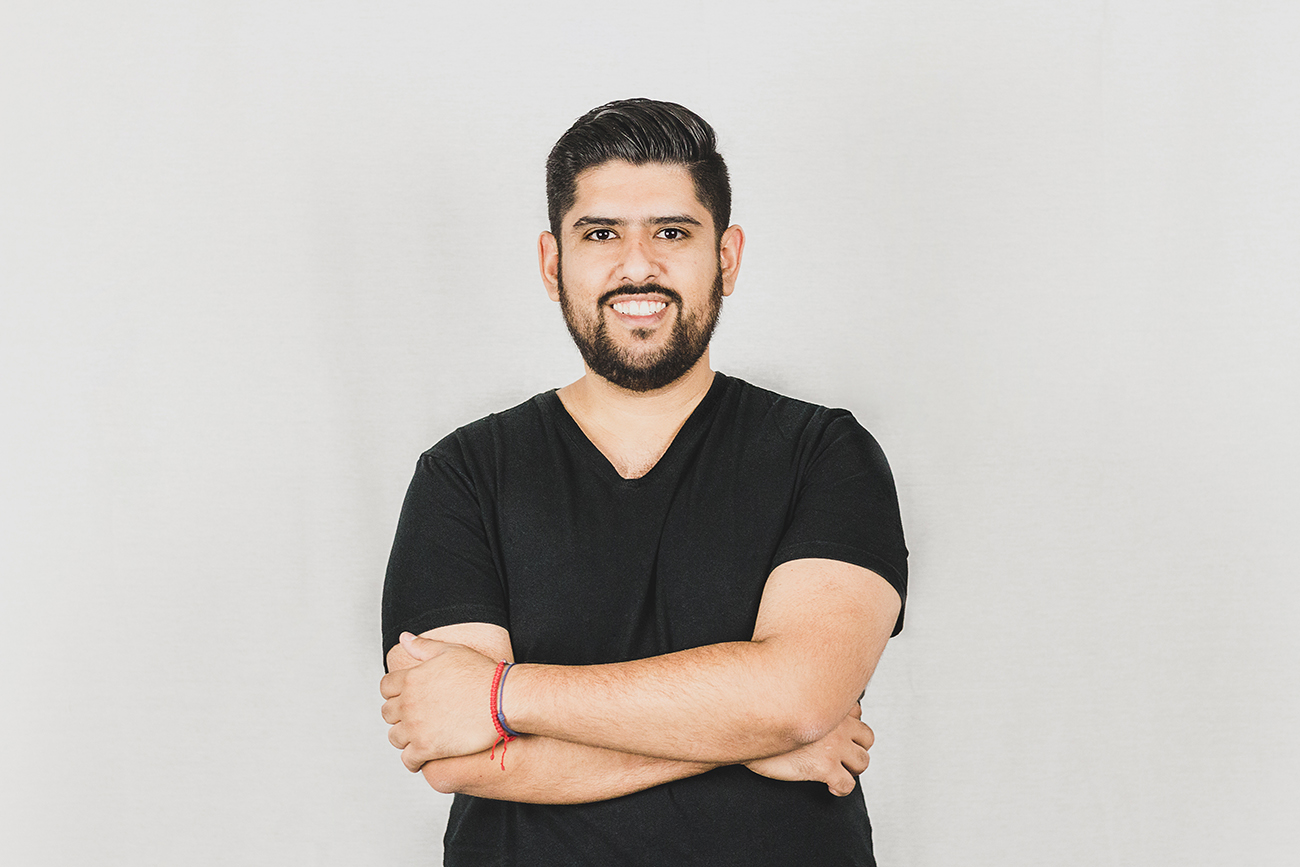
César Esquivel is a biomedical engineer. He graduated Cum Laude, Magna Cum Laude, and Summa Cum Laude from the Universidad de Monterrey, where he worked as director of the Academical Program of the Biomedical Engineer course. He also holds a master’s degree in hospital and health care services administration. In 2016 he was selected as the Social Entrepreneur of the Year by MIT Technology Review. In the same year, the Inter-American Development Bank named Blooders as one of the 14 most innovative startups related to health and water sanitation in Latin America.
For more information visit:
blooders.org
Facebook
Twitter
LinkedIn
Youtube
Works Cited
1 www.hofstede-insights.com/country/mexico/
2 Statistics of deaths of the 2017’s earthquake in Mexico by National Institute of Statistics and Geography. www.inegi.org.mx/contenidos/saladeprensa/


